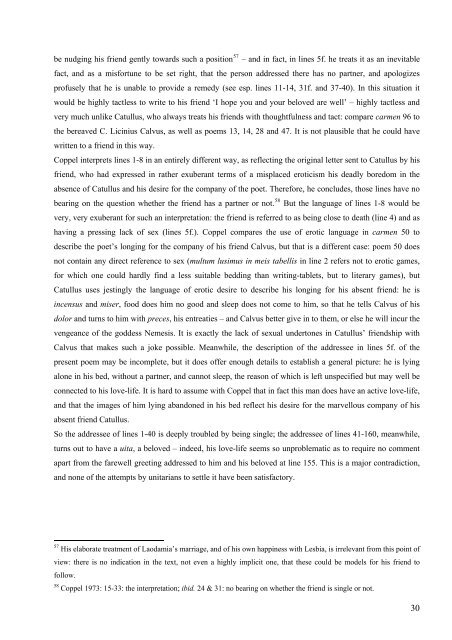CATULLUS 68 - Scuola Normale Superiore
CATULLUS 68 - Scuola Normale Superiore
CATULLUS 68 - Scuola Normale Superiore
You also want an ePaper? Increase the reach of your titles
YUMPU automatically turns print PDFs into web optimized ePapers that Google loves.
e nudging his friend gently towards such a position 57 – and in fact, in lines 5f. he treats it as an inevitable<br />
fact, and as a misfortune to be set right, that the person addressed there has no partner, and apologizes<br />
profusely that he is unable to provide a remedy (see esp. lines 11-14, 31f. and 37-40). In this situation it<br />
would be highly tactless to write to his friend ‘I hope you and your beloved are well’ – highly tactless and<br />
very much unlike Catullus, who always treats his friends with thoughtfulness and tact: compare carmen 96 to<br />
the bereaved C. Licinius Calvus, as well as poems 13, 14, 28 and 47. It is not plausible that he could have<br />
written to a friend in this way.<br />
Coppel interprets lines 1-8 in an entirely different way, as reflecting the original letter sent to Catullus by his<br />
friend, who had expressed in rather exuberant terms of a misplaced eroticism his deadly boredom in the<br />
absence of Catullus and his desire for the company of the poet. Therefore, he concludes, those lines have no<br />
bearing on the question whether the friend has a partner or not. 58 But the language of lines 1-8 would be<br />
very, very exuberant for such an interpretation: the friend is referred to as being close to death (line 4) and as<br />
having a pressing lack of sex (lines 5f.). Coppel compares the use of erotic language in carmen 50 to<br />
describe the poet’s longing for the company of his friend Calvus, but that is a different case: poem 50 does<br />
not contain any direct reference to sex (multum lusimus in meis tabellis in line 2 refers not to erotic games,<br />
for which one could hardly find a less suitable bedding than writing-tablets, but to literary games), but<br />
Catullus uses jestingly the language of erotic desire to describe his longing for his absent friend: he is<br />
incensus and miser, food does him no good and sleep does not come to him, so that he tells Calvus of his<br />
dolor and turns to him with preces, his entreaties – and Calvus better give in to them, or else he will incur the<br />
vengeance of the goddess Nemesis. It is exactly the lack of sexual undertones in Catullus’ friendship with<br />
Calvus that makes such a joke possible. Meanwhile, the description of the addressee in lines 5f. of the<br />
present poem may be incomplete, but it does offer enough details to establish a general picture: he is lying<br />
alone in his bed, without a partner, and cannot sleep, the reason of which is left unspecified but may well be<br />
connected to his love-life. It is hard to assume with Coppel that in fact this man does have an active love-life,<br />
and that the images of him lying abandoned in his bed reflect his desire for the marvellous company of his<br />
absent friend Catullus.<br />
So the addressee of lines 1-40 is deeply troubled by being single; the addressee of lines 41-160, meanwhile,<br />
turns out to have a uita, a beloved – indeed, his love-life seems so unproblematic as to require no comment<br />
apart from the farewell greeting addressed to him and his beloved at line 155. This is a major contradiction,<br />
and none of the attempts by unitarians to settle it have been satisfactory.<br />
57<br />
His elaborate treatment of Laodamia’s marriage, and of his own happiness with Lesbia, is irrelevant from this point of<br />
view: there is no indication in the text, not even a highly implicit one, that these could be models for his friend to<br />
follow.<br />
58<br />
Coppel 1973: 15-33: the interpretation; ibid. 24 & 31: no bearing on whether the friend is single or not.<br />
30






